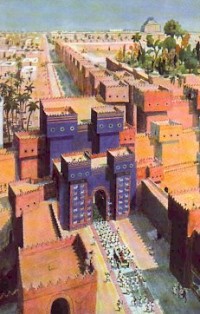Berossus on Nebuchadnezzar
The third book of Berossus' Babylonian history we find accounts of the reigns of several kings. One of these is the Babylonian king Nebuchadnezzar II (605-562). Unfortunately, Berossus' own account is lost, but it was summarized by the Jewish historian Flavius Josephus in his Against Apion, which was translated by William Whiston.

Berossus [...] at length comes down to Nabopolassar, who was king of Babylon and the Chaldaeans. And when he was relating the acts of this king, he describes to us how he sent his son Nebuchadnezzar against Egypt, and against our land [Judah], with a great army, upon his being informed that they had revolted from him; and how, by that means, he subdued them all, and set our temple that was at Jerusalem on fire; nay, and removed our people entirely out of their own country, and transferred them to Babylon;note when it so happened that our city was desolate during the interval of seventy years, until the days of Cyrus king of Persia.
Berossus then says, "that this Babylonian king conquered Egypt,note and Syria, and Phoenicia, and Arabia, and exceeded in his exploits all that had reigned before him in Babylon and Chaldaea."
A little after which Berossus subjoins what follows in his History of Ancient Times. I will set down Berossus' own accounts, which are these: "When Nabopolassar, father of Nebuchadnezzar, heard that the governor whom he had set over Egypt [3], and over the parts of Coele-Syria and Phoenicia, had revolted from him, he was not able to bear it any longer; but committing certain parts of his army to his son Nebuchadnezzar, who was then but young, he sent him against the rebel: Nebuchadnezzar joined battle with him, and conquered him, and reduced the country under his dominion again.
Now it so fell out that his father Nabopolassar fell into a distemper at this time, and died in the city of Babylon, after he had reigned twenty-nine years. But as he understood, in a little time, that his father Nabopolassar was dead, he set the affairs of Egypt and the other countries in order, and committed the captives he had taken from the Jews, and Phoenicians, and Syrians, and of the nations belonging to Egypt, to some of his friends, that they might conduct that part of the forces that had on heavy armor, with the rest of his baggage, to Babylonia; while he went in haste, having but a few with him, over the desert to Babylon; whither, when he was come, he found the public affairs had been managed by the Chaldaeans, and that the principal person among them had preserved the kingdom for him.
Accordingly, he now entirely obtained all his father's dominions. He then came, and ordered the captives to be placed as colonies in the most proper places of Babylonia; but for himself, he adorned the temple of Bêl [Esagila], and the other temples, after an elegant manner, out of the spoils he had taken in this war.
He also rebuilt the old city, and added another to it on the outside, and so far restored Babylon, that none who should besiege it afterwards might have it in their power to divert the river, so as to facilitate an entrance into it; and this he did by building three walls about the inner city, and three about the outer. Some of these walls he built of burnt brick and bitumen, and some of brick only.
So when he had thus fortified the city with walls, after an excellent manner, and had adorned the gates magnificently, he added a new palace to that which his father had dwelt in, and this close by it also, and that more eminent in its height, and in its great splendor. It would perhaps require too long a narration, if any one were to describe it. However, as prodigiously large and as magnificent as it was, it was finished in fifteen days. Now in this palace he erected very high walks, supported by stone pillars, and by planting what was called a pensile paradise, and replenishing it with all sorts of trees, he rendered the prospect an exact resemblance of a mountainous country. This he did to please his queen, because she had been brought up in Media, and was fond of a mountainous situation."
This is what Berossus relates concerning the forementioned king, as he relates many other things about him also in the third book of his Chaldean History; wherein he complains of the Greek writers for supposing, without any foundation, that Babylon was built by Semiramis, queen of Assyria, and for her false pretense to those wonderful edifices thereto buildings at Babylon, do no way contradict those ancient and relating, as if they were her own workmanship; as indeed in these affairs the Chaldean History cannot but be the most credible.